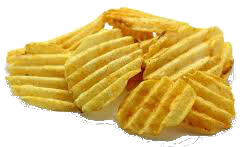Brittleness: Difference between revisions
From DT Online
Created article |
mNo edit summary |
||
| (4 intermediate revisions by the same user not shown) | |||
| Line 1: | Line 1: | ||
[[File:Crisps.png|300px|right]] | [[File:Crisps.png|300px|right]] | ||
Materials which are [https://en.wikipedia.org/wiki/Brittleness '''Brittle'''] break suddenly with | Materials which are [https://en.wikipedia.org/wiki/Brittleness '''Brittle'''] break suddenly with little or no deformation first - like a stick of chalk or a potato crisp! ''(ie. they have little or no '''[[Plasticity]]''')''. This can make them very dangerous in engineering situations since components may snap without warning, but they are also strong in '''[[Compression]]'''. | ||
One solution when using normally '''Brittle''' materials such as [https://en.wikipedia.org/wiki/Concrete '''Concrete'''] is to keep them in '''[[Compression]]''' even when they are deployed in situations which may expose them to '''[[Tension|Tensile Forces]]'''. | |||
This achieved for [https://en.wikipedia.org/wiki/Prestressed_concrete '''Pre-Stressed Concrete Beams'''] for example by casting the concrete around steel rods or wires which have been first stretched such that when the concrete sets they continue to pull the ends of the beam inwards. Similarly, [https://en.wikipedia.org/wiki/Toughened_glass '''Toughened Glass'''] is heat treated such that the resulting '''''tempering''''' puts the inner surfaces into tension.thus pulling the outer surfaces into compression to close up any cracks before they can propagate. This is achieved by rapidly air cooling the outer layer whilst the inner layer is left free to flow and pull against the solidified outer as it cools naturally. | |||
[[Category:Terminology]] | |||
Latest revision as of 11:42, 21 March 2017

Materials which are Brittle break suddenly with little or no deformation first - like a stick of chalk or a potato crisp! (ie. they have little or no Plasticity). This can make them very dangerous in engineering situations since components may snap without warning, but they are also strong in Compression.
One solution when using normally Brittle materials such as Concrete is to keep them in Compression even when they are deployed in situations which may expose them to Tensile Forces.
This achieved for Pre-Stressed Concrete Beams for example by casting the concrete around steel rods or wires which have been first stretched such that when the concrete sets they continue to pull the ends of the beam inwards. Similarly, Toughened Glass is heat treated such that the resulting tempering puts the inner surfaces into tension.thus pulling the outer surfaces into compression to close up any cracks before they can propagate. This is achieved by rapidly air cooling the outer layer whilst the inner layer is left free to flow and pull against the solidified outer as it cools naturally.